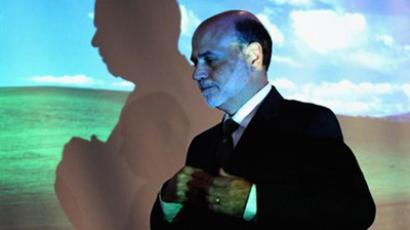No big surprise: Wall Street rules
The mainstream media was thrown into a tailspin after an independent trader revealed how the world of big money and politics looks from the inside. But why were Alessio Rastani’s revelations come as such a surprise?
“The government doesn’t rule the world. Goldman Sachs rules the world,” stock trader Alessio Rastani said on the BBC.This was the comment which echoed around the world, generating a tidal wave of reaction from papers and pundits alike.But instead of focusing on the comment itself, most outlets immediately sought to shoot the messenger.Forbes called him a psychopath. CNBC suggests it might be a hoax. New Yorker magazine wondered if it was a con, or a nightmare come true. Whatever Rastani’s intentions, the bigger question has been largely ignored. Was he wrong about the power of Goldman Sachs? And why was everyone so shocked? Several of RT’s guests – bona fide traders and former Goldman Sachs employees – have said much the same. “Washington is not the biggest player in this. The global bankers are the biggest players, the global hedge fund managers. That’s who is determining the outcome of this, not the players in Washington. They have already ceded control to the global banking industry,” said RT’s Max Keiser, a former equities trader.“Wall Street has been pulling the strings in Washington from the get-go. It is the largest sector of campaign contributions – and that is to both parties,” said Nomi Prins, a former managing director at Goldman Sachs.But for a mainstream media unaccustomed to such candor, Rastani’s honesty was unexpected, says George Hemminger of Survive and Thrive TV.“When they asked him these questions on the BBC, he just let it all hang out and the actual truth came across,” Hemminger said.Rastani also sent shockwaves around the world when he said that most traders do not really care when or even if the economy is fixed.“Personally, I’ve been dreaming of this moment for three years,” he said. “I have a confession – I go to bed every night and I dream about another recession.”“I don’t know if you can see us, but our jaws dropped,” the anchorwoman responded.Their jaws might have stayed firmly in place had they only read Matt Taibbi’s July 2009 Rolling Stone article – "The great American bubble machine." In it, he famously described Goldman Sachs as "a great vampire squid wrapped around the face of humanity, relentlessly jamming its blood funnel into anything that smells like money."Matt Taibbi discussed with RT recently how – although people are unaware of it – the big banks have far-reaching power in our society.“How much are you paying for gas, how much are you paying for electricity, your mortgages, how much are you paying in taxes, and how much of your tax dollars are going to service debt?” Taibbi said.Unlike the mainstream media, few of those protesting on Wall Street would be shocked by Rastani’s comments.For nearly two weeks, these protesters have been out every day, hoping to bring an end – or at least awareness – to what many of them say is a corrupt system.And still others have argued for years that the government’s actions are dictated by the big banks.“The very special interests on Wall Street, the insurance industry,” said Peter Schiff, CEO of Euro Pacific Capital. “These are the people who are writing the laws that Obama is passing. They are keeping him in power, they are the ones that have financed his campaign and the laws are being written for their benefit.”As anger builds on Wall Street, the need for the media to ask better questions becomes more urgent, so that a message is sent to decision-makers in Congress that the system that has been sustained and protected for decades might actually need to change.














